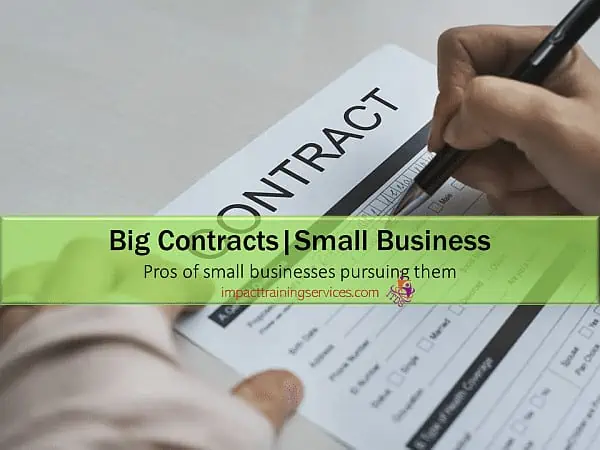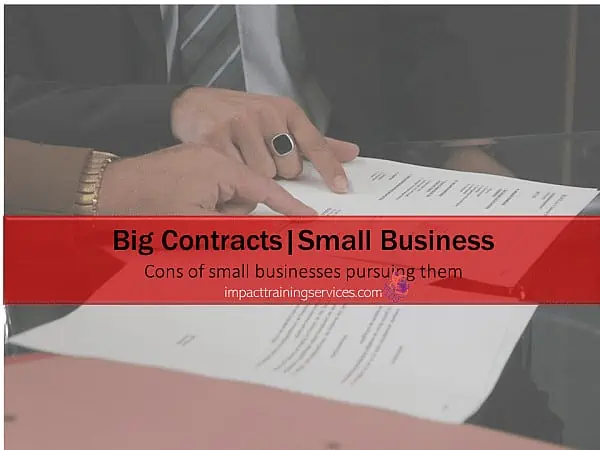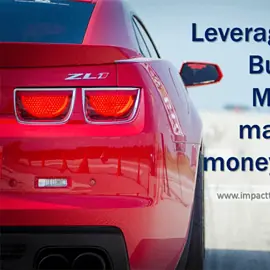Last Updated on March 31, 2024 by Lorna Barrow

It’s every small business owner, consultant and entrepreneur’s dream: A Big contract for their small business.
What am I talking about?
You know…that large contract from a prestigious client that sets you up for at least a year. It lets you pay off all the non-routine bills and buy a membership in the local “holier-than-thou club.”
Yeah…the one that makes your colleagues regard you with awe and admiration. And leaves your competition coughing and sneezing from all the dust you kicked in their faces.
So you’re fortunate and your dreams came true and now you’re asking:
how did this gem of a contract morph into the worse nightmare of my life?
Often large contracts don’t look that risky when you land them. That’s the tricky part. I found out from personal experience, that big contracts can lead to big headaches and small profits.
I also know that in the excitement of winning the contract, you often forget to consider the pros and cons of delivering on that very contract.
So, let’s examine some of them here and then I will give you some advice, so you’ll be ready to make the right decision next time around.
Pros of a Big Contract For Small Businesses

1. It’s a yardstick by which to measure success
Don’t pretend you don’t know what I’m talking about.
When you land a big contract from a well-known client, all you little repeat customers or clients seem to fade into insignificance.
When you can brag that you did work for the “Big Mcguffie Inc” some people will not wait to find out what you did before they begin to spread the word about your success.
2. It can improve your bottom line
Yes, it can improve your bottom line, especially if you manage it carefully. Additionally, this improved bottom line can also help you to keep your cash flow positive, even if you’re not in retail.
Think about this: You will be able to replace that aging machinery and pay off your non-routine bills as well.
3. A big contract can improve the way you do business
Just imagine that you have decided to do what is required to go after a big contract, and to make as much money as you can from it.
This may require you to examine many of your systems:
- hiring
- planning
- leading/managing
- coordinating
- negotiating
- budgeting
While these may be in the short term during the contract, the benefits continue way into the future.
Cons of Big Contracts For Small Businesses

1. You need the cash flow and infrastructure to manage a really big contract
Depending on the nature of the contact, yes, you may be able to subcontract. But that requires you to manage that relationship(s) as well as deliver on the contract as required.
You also need to be able to pay your sub-contractors when they have delivered their part of the job, even if you have not been paid on your contract.
2. The bidding process can be long, complex and costly
I can tell you about this!
Once, out of curiosity, I decided to initiate the process of going after a big contract. The specs were on a CD and I had to pay US$50.00 for it. After I bought it, I nearly had to hire someone to help me understand the requirements.
And I hate to tell you, sometimes they have already selected a service provider, and putting the job out to tender is only to appear transparent.
3. A big business might negotiate you into the ground
You see, they have the power and resources to do this and the bigger the contract, the bigger the demands they make.
In addition, they will sometimes want something redesigned that you already have already agreed on – at no cost to them. You had better upscale your negotiation skills…you will need them.
4. Your big customer demand more and better services
You were going along peacefully running items through your cash register and placing them in a plain plastic bag and handing them to your customers with a smile.
Now that you’ve landed that big order, you now need to have bar coding on the items, inventory controlled tags as well, and they need to be shipped in a special way. The changes that you have to make can wipe out as much as 75% of your profit on the contract.
5. The agreed payment terms may result in cash flow problems
Think about it.
Your smaller customers pay in 25 to 30 days and you know what to do when they don’t pay. But this big customer wants to pay in 60 – 90 days and you can only hope they pay on time.
The problem is, your suppliers and your Landlord will not wait so long to get paid from you. If you don’t have enough cash to pay your bills until you collect, you’ll need to borrow working capital or factor your receivables.
Either option will add to your costs and cut your profit.
Tips on going after a big contract
Now that you know some of what you need to think about before you go after that big contract, let them serve as a warning and not prevent you from going after the big bucks.
So what should you do when you want to go after a big contract?
1. Know the cost involved in acquiring and delivering on such a contract
If you’re like me and had to pay for the documents, include that cost.
Include the cost of the time in preparing the proposal, for you and your team, if you use one.
If the contract is for the supply of products, determine what your cost of goods or inventory costs are, at different volumes.
Know what the packaging and shipping costs would be, as well. Be sure to include the hourly cost of the employees needed to pack and ship the goods and the actual cost of the packaging and labels.
2. Check on your manpower and equipment
Determine whether your company would have the manpower and equipment to get the big order out on time – every time. And you must do so without interrupting service to your existing customers.
3. Put your cash flow under the microscope
Do you have the cash to satisfy a big contract and then wait 60 – 90 days for payment?
If you have to borrow the money in the short term, check the interest rates to be sure it’s worth the while.
When you have all the numbers in front of you, then and only then, should you answer the question: This big contract for my small business…is it worth the money?
4. Make sure the agreement is fair (to you)
Any firm which can offer you a substantial contract, you can bet, will have the resources to provide you with a comprehensive agreement. Such an agreement will be often written in legal gobbledygook and largely in their favour.
Don’t be afraid to have your lawyer review this agreement and explain it to you.
Also, make sure they are clear terms that protect you from scope creep and be very clear about the payment terms.
5. What if the offer for a big contract is from an overseas firm…
In this case, you’re exporting and that’s a whole other ball game.
First, make sure your company is ready to export. The video below will give you an overview of the export process.
In addition, here are some more things to consider:
1. protect you intellectual property
2. make sure your product complies with (their) market regulations
3. price your product properly for your export market
4. do your due diligence – bank/credit card reference on your importer
5. minimise the risk of fraud
6. file for protection in the country or countries you’re exporting to copyright, trademarks
7. get help from your local export agency…if there’s one
6. Get Your Testimonials and Referrals Ready
Some firms offering you a big contract will as for testimonials or referrals.
Don’t just provide the first name that comes to your mind. Provide those that highlight you’re capable of doing what they want you to do for them. And whatever you do, don’t provide any that are not genuine.
In the case of referrals, be sure to ask the “referee” first.
Your Next “Big Contract” Step
So there you have them! The pros and cons of going after a big contract when you’re a small business.
Please notice I have reduced the ordeal you would otherwise face, if you had tried attracting big business, without this information.
And I did not leave you there, I gave you some proven, practical tips to make sure you’re not missing out on that next big contract.
But even with these, we’re barely scratching the surface. So I want you to remedy that.
Very simply, I want you to take all the information, step out of your comfort zone, and go for the next “big money” opportunity. I can’t guarantee you will get it, but I can’t guarantee that you won’t.
In other words, not only do you have nothing to lose…you have everything to win.
To you next big contract…



